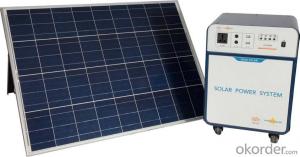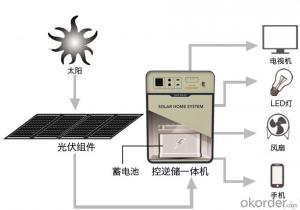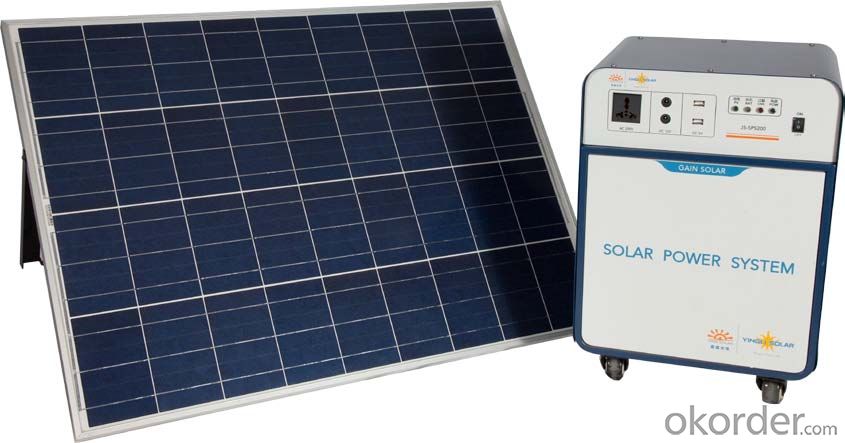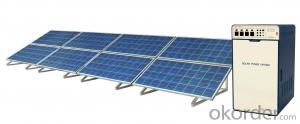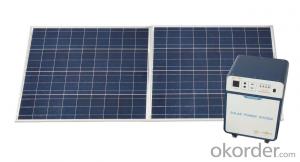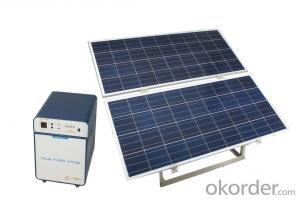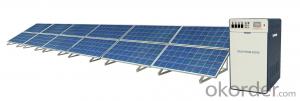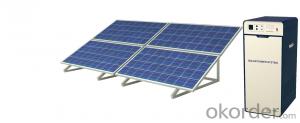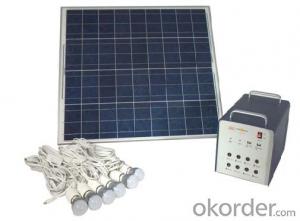Solar Energy Systems Carlisle JS-SPS-200 Off-Grid Solar Power System
- Loading Port:
- Tianjin
- Payment Terms:
- TT OR LC
- Min Order Qty:
- 10 set
- Supply Capability:
- 10000 set/month
OKorder Service Pledge
OKorder Financial Service
You Might Also Like
General Introduction
Solar power system provides alternating current and direct current, which is produced by the modules transforming solar power into power, to home lighting, household appliance and other DC appliance, such as cell phone and laptop.
Solar power system is widely used in area lack of power, for example house power supplying, monitoring, communication base, fire prevention in forest area, pasture and meadow, aquaculture etc.
We are dedicated to provide high quality off-grid PV products and systems to customers and has received a series of certificate, including ISO9001, TUV, UL, CE, CQC and RoHS.
Off-grid Solar Power System
High efficent PV module can produce more power.
Sine wave output is suitable for all kinds of load. Varieties of DC output, let it more
convenient for users.
The multifunction design make it easy to operation and maintenance.
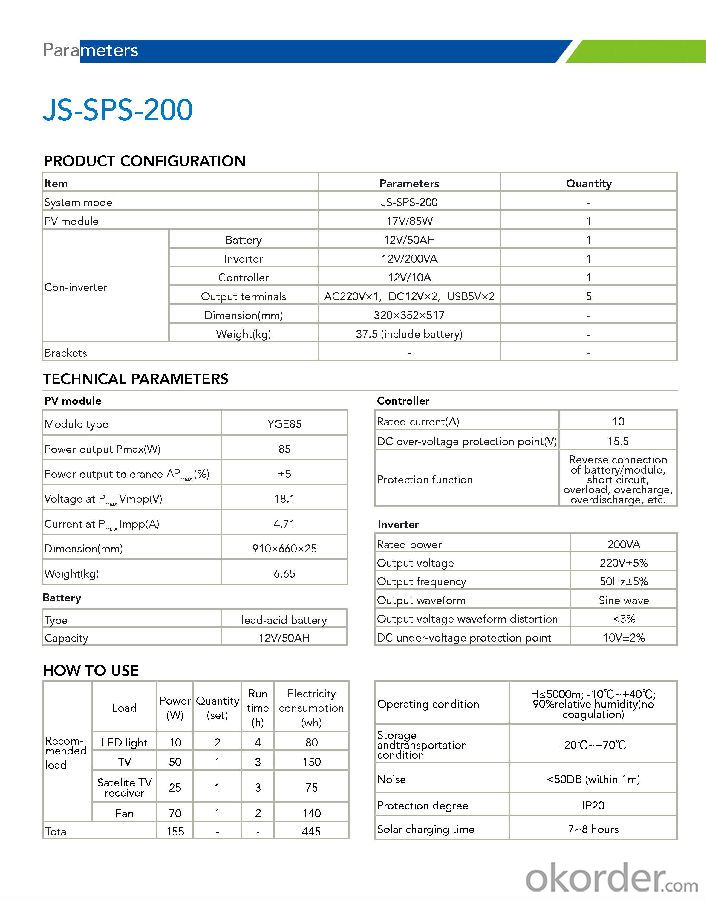
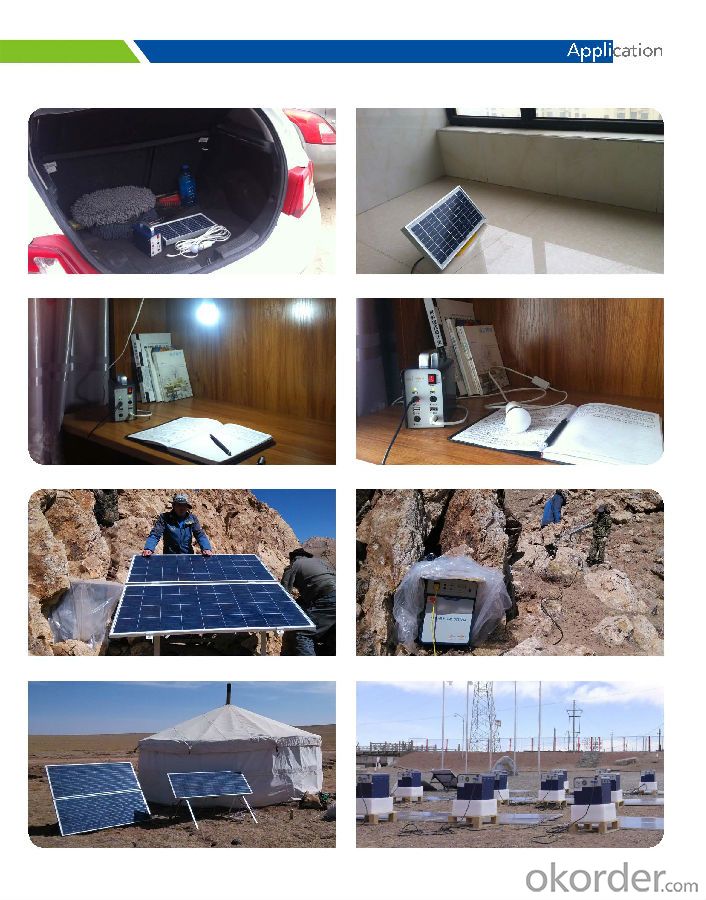

- Q: What is the cost of installing a solar energy system?
- The cost of installing a solar energy system can vary depending on various factors such as the size of the system, location, and specific requirements. On average, the cost can range from $10,000 to $30,000 or more. However, there are also various incentives, tax credits, and financing options available that can help offset the initial cost. It is recommended to consult a solar energy provider or contractor to get an accurate estimate based on your specific needs and circumstances.
- Q: Are there any noise or pollution concerns with solar energy systems?
- No, solar energy systems do not produce noise or pollution. They generate electricity by harnessing the power of sunlight, which is a clean and renewable source of energy.
- Q: What is the expected return on investment for a solar energy system?
- The return on investment (ROI) for a solar energy system can vary based on several factors, such as the initial cost, location, available incentives, and energy usage. Typically, solar energy systems are expected to yield a positive ROI over their lifespan. Installing a solar energy system involves a significant upfront investment, including expenses for solar panels, inverters, and installation. However, the decreasing costs of solar technology in recent years have made the initial expense more affordable. The location of the solar energy system is crucial in determining the expected ROI. Areas with higher solar irradiance and longer sunshine hours tend to generate more electricity, resulting in a higher ROI. Additionally, net metering policies that allow excess electricity to be credited back to the owner can further boost the ROI. Government incentives and subsidies can have a significant impact on the expected ROI. Many countries provide tax credits, grants, and rebates to promote the adoption of solar energy systems. These incentives reduce the initial cost and expedite the payback period, thus enhancing the overall ROI. Furthermore, the energy usage of the property plays a critical role in determining the expected ROI. Higher electricity consumption offers more opportunities for the solar energy system to offset utility bills, resulting in greater savings and an improved ROI. While the specific ROI can vary, studies indicate that solar energy systems typically recoup their costs within 5 to 10 years and continue to generate free electricity for several decades. This extensive period of energy production allows for substantial savings on utility bills and a positive ROI over the system's lifetime. In summary, investing in a solar energy system can provide long-term financial benefits, including reduced electricity costs, potential revenue from excess electricity generation, and increased property value. Conducting a comprehensive evaluation considering the aforementioned factors is crucial in determining the expected ROI for a solar energy system in a specific scenario.
- Q: What is the role of solar-powered water purification systems in providing clean drinking water?
- Solar-powered water purification systems play a crucial role in providing clean drinking water by harnessing the energy of the sun to remove harmful contaminants and pathogens from water sources. These systems use solar panels to generate electricity, which powers the purification process, making them environmentally friendly and cost-effective. They are especially valuable in remote or off-grid areas where access to clean water is limited. Additionally, solar-powered water purification systems are easy to maintain, making them a sustainable solution for ensuring clean and safe drinking water for communities worldwide.
- Q: How do solar energy systems impact the structural integrity of a building?
- Solar energy systems have a minimal impact on the structural integrity of a building. In fact, they are designed to be installed on rooftops or as standalone structures without compromising the structure's stability. The weight of solar panels is relatively light, and modern technologies have made them even lighter than before. The panels are typically mounted on racks or frames that distribute the weight evenly across the surface area. Additionally, roof-mounted solar panels are usually installed with the help of professional engineers who ensure that the load is properly distributed and does not exceed the roof's weight-bearing capacity. Moreover, solar panels act as a protective layer for the roof by shielding it from direct sunlight, rain, and other weather elements. This can actually extend the lifespan of the roof by preventing UV damage and reducing the thermal stress caused by extreme temperatures. In some cases, additional reinforcement may be required, especially for installations on older buildings or in areas prone to seismic activity or heavy snow loads. However, these considerations are part of the installation process and are taken into account by experienced professionals. Overall, solar energy systems have a negligible impact on the structural integrity of a building and can even provide added protection to the roof. They are designed to be safe, reliable, and durable, ensuring the long-term stability and sustainability of the building.
- Q: Can solar energy systems be used for powering electric car wash systems?
- Yes, solar energy systems can indeed be used to power electric car wash systems. By installing solar panels, the energy from the sun can be harnessed and converted into electricity to power the car wash equipment. This renewable energy source offers an eco-friendly and sustainable alternative to traditional electricity sources.
- Q: Can solar energy systems be used in powering swimming pools or spas?
- Yes, solar energy systems can be used to power swimming pools or spas. Solar panels can be installed to capture sunlight and convert it into electricity, which can then be used to run the pool's pump, heater, and other equipment. This helps to reduce energy costs and reliance on traditional power sources.
- Q: Can solar energy systems be used for large-scale power generation?
- Yes, solar energy systems can be used for large-scale power generation. With advancements in technology and decreasing costs, solar power plants and solar farms are being built around the world to generate electricity on a large scale. These solar energy systems utilize photovoltaic panels or concentrated solar power technology to convert sunlight into electricity, making them a sustainable and renewable source of power for meeting the energy demands of entire communities or even countries.
- Q: How do solar energy systems affect energy bills?
- Solar energy systems can significantly reduce energy bills, as they generate electricity from the sun, eliminating the need to purchase as much energy from the grid. By harnessing solar power, homeowners can offset their electricity consumption, resulting in lower energy bills and potential savings.
- Q: Are there any risks of electrical malfunctions or failures during extreme weather events with solar energy systems?
- Yes, there are some risks of electrical malfunctions or failures during extreme weather events with solar energy systems. Severe weather conditions such as hurricanes, tornadoes, hailstorms, or heavy snowfall can potentially damage solar panels, inverters, or electrical wiring, leading to system failures. Additionally, lightning strikes can pose a risk to solar energy systems, potentially causing damage or complete failure. However, proper installation, regular maintenance, and adhering to industry standards can help mitigate these risks and ensure the resilience of solar energy systems during extreme weather events.
Send your message to us
Solar Energy Systems Carlisle JS-SPS-200 Off-Grid Solar Power System
- Loading Port:
- Tianjin
- Payment Terms:
- TT OR LC
- Min Order Qty:
- 10 set
- Supply Capability:
- 10000 set/month
OKorder Service Pledge
OKorder Financial Service
Similar products
Hot products
Hot Searches
Related keywords
